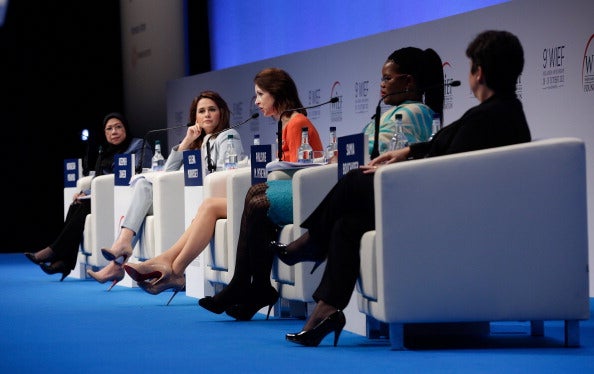The progress of women in business around the world still has some way to go
As the Graduate Management Admission Council (GMAC) releases global statistics and information on women in business, what does this mean for female entrepreneurs around the world?

Your support helps us to tell the story
From reproductive rights to climate change to Big Tech, The Independent is on the ground when the story is developing. Whether it's investigating the financials of Elon Musk's pro-Trump PAC or producing our latest documentary, 'The A Word', which shines a light on the American women fighting for reproductive rights, we know how important it is to parse out the facts from the messaging.
At such a critical moment in US history, we need reporters on the ground. Your donation allows us to keep sending journalists to speak to both sides of the story.
The Independent is trusted by Americans across the entire political spectrum. And unlike many other quality news outlets, we choose not to lock Americans out of our reporting and analysis with paywalls. We believe quality journalism should be available to everyone, paid for by those who can afford it.
Your support makes all the difference.The Graduate Management Admission Council (GMAC) has been busy compiling stats and information on women in business around the world. Have their results been surprising? Well, as can be expected, both yes and no.
Some countries that ranked lower on the Gender Inequality Index (GII) have a higher percentage of women in high status jobs – South Africa and Russia, for instance – whereas some countries which ranked higher on the GII have a lower number of women in powerful positions, such as Belgium and Argentina.
So, what does this mean for women the world over as it stands today? Put simply, it means they live in complex situations and that they also come up with ways of handling and challenging the systems wherever they may be. For example, though Russia may be known for its nationalism and homophobia – as well as banning women from around 460 occupations – 40 per cent of people in senior management roles are women.
The Philippines – though said to be corrupt and nespotic in many ways – is the ninth most equal place in the world for women in senior management, with 37 per cent of females in such roles as of 2014. Countries with a higher number of women senior executives tend to have a higher number of women undertaking the Graduate Management Admission Test (GMAT) exam.
The questions now revolve around the ‘how?’ and ‘why?’ and one of the answers could be down to internalised sexism. Interviews with women from Italy, Great Britain, and Belgium reflected such a sentiment. When asked: ‘Do you feel being a woman has affected your career?’ Michelle Wright, founder and CEO of Cause4, said: “The further I develop my business the more I realise that, often, females are less confident and less assured in how to grow and scale a business. Sadly, often it can be other female businesspeople that exacerbate this.”
Meanwhile, Michelle Wille from Belgium answered: “To some extent, yes – but it’s more our own fault, I think. It has been demonstrated, for example, that women in general are less convinced they are good candidates for promotions.”
Again, however, whilst these sentiments may explain some things, they do not take context into account – hence why some socio-historic context is provided. Russia, being an ex-Communist country, has had women working in many types of industries for decades. Also, technology and the advent of the Internet have had a dramatic impact upon working women the world over.
South-East Asia, China, Russia, and many areas of Eastern Europe have undergone, and are still undergoing, a tech boom. STEM subjects are also studied by women in greater numbers in these countries. Internet-only businesses, crowdfunding, and the ability to access educational material without the need to go to a specific school or teacher has meant the traditional way of doing business – by getting a loan from a bank, needing permits, or land for a business – are looking stifling rather than liberating. The barriers of entry are either lowering or changing almost entirely.
This represents both a conundrum and opportunity for women globally. After all, if women in far more unequal societies are making a name for themselves in the world of business, what are the women of more industrialised and equal societies doing to compete and be seen?
Perhaps this ‘internalised sexism’ is more pervasive than we think, and this affects many other areas of women’s careers. Or perhaps there are other factors at play as well, one of personal choice – keeping a work/life balance is a common reason for women not wanting to work in positions of high responsibility – and/or because many Western countries have a distinctly different culture with regards to education? The answers are, in general, a bit more complicated than we might like to give credit for.
This infographic, in the meantime, shows us where we are right now in most of the world’s most populated countries, leaving us with the question: ‘Where are we going now?’
Dipak Hemraj is a freelance writer with an interest in women’s issues around the world
Join our commenting forum
Join thought-provoking conversations, follow other Independent readers and see their replies
Comments